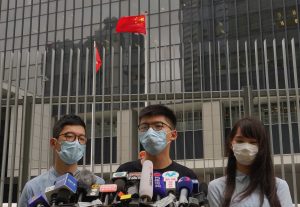Hong Kong pro-democracy activist Joshua Wong was arrested again Thursday. The 23-year-old tweeted that he was arrested when he reported to Hong Kong’s Central Police Station as part of a bail requirement.
Wong said he was arrested this time for allegedly participating in an unauthorized assembly last October, and also accused of violating a pre-coronavirus law banning the wearing of masks in public places. Together, the two charges would carry a maximum penalty of five years in prison.
Wong was not detained overnight, but called his subsequent release “nothing to celebrate.” He told reporters after leaving the police station that it is the third case against him and vowed to continue to resist.
“Today’s arrest is a notorious abuse to the criminal justice system by placing charges ruled unconstitutional earlier,” he tweeted, referring to the mask ban, which was partially overturned by Hong Kong’s Court of Appeals in April “However, I choose not to surrender.”
Wong said the case would be formally registered in court next week.
Wong rose to prominence as a student leader during Hong Kong’s 2014 Umbrella Movement protests for universal suffrage. Since then, he has been an outspoken pro-democracy voice in the Chinese special administrative region. That made him a target when Beijing imposed a sweeping national security law on Hong Kong that has severely restricted political speech. Wong was a high-profile supporter of the anti-government protests last year that led to Beijing imposing the new law, although the movement was largely leaderless.
Wong is among a growing number of activists being charged for various relatively minor offenses. Notably, fewer charges have been brought under the controversial national security law itself. However, with Beijing’s encouragement, Hong Kong authorities have been pursuing charges against major opposition figures for illegal assembly and other minor infractions in what some call a campaign to harass and intimidate. Many of the charges date back to alleged offenses from the summer and fall of 2019, raising further questions as to the lengthy delay before the arrests.
Last year, Wong was barred from running in Hong Kong’s District Council elections due to his alleged support for Hong Kong independence, which would be a crime punishable by up to life in prison under the new national security law. However, the law specifically declares it is not retroactive, meaning it cannot be applied to supposed offenses that took place before July 1, 2020. Since then, Wong has taken some steps to protect himself from national security law-related charges, including resigning from his leadership role in the pro-democracy party Demosisto. The group had been labeled “pro-independence” and thus affiliation with it would be punishable under the new law.
Wong’s fellow Demosisto leaders, Agnes Chow and Nathan Law, also resigned from the party, leading to its disbanding. Since then, the fates of the three young pro-democracy activists showcase the changes underway in Hong Kong’s political sphere.
Chow, 23, was arrested in August and charged with “colluding with foreign forces” under the new national security law (a charge that can apply to simply calling publicly for international sanctions on Hong Kong). She thus faces up to lifetime imprisonment, unlike Wong, who has been hit with multiple lesser charges. (Chow has previously been arrested on charges of illegal assembly, similar to Wong, as well.)
Chow is currently free on bail, but her arrest sparked an outpouring of support, earning her nicknames such as the “Real Mulan” and the “Goddess of Democracy.” Notably, she used to hold British citizenship, but gave it up in 2018 to run in a by-election for Hong Kong’s Legislative Council. She too was banned from standing for election due to her support for “self-determination” for Hong Kong.
Nathan Law, who at 27 qualifies as an elder statesman in Hong Kong’s protest movement, took a different path. He escaped arrest by moving to the United Kingdom shortly after the national security law took effect. He vowed to continue the fight for Hong Kong’s future from exile. Moving abroad gave Law more freedom to speak out, and particularly to engage with international advocacy groups as well as politicians – something now forbidden under the “collusion with foreign forces” umbrella of the national security law. Indeed, the Hong Kong police have issued a warrant for Law’s arrest, according to Chinese state media. CCTV claimed in late July that Law and five other “trouble-makers” are wanted on charges of “incitement to secession and collusion with foreign forces.”
“It has been a tough year for me – leaving my hometown and embarking on an exiled life,” Law wrote on Twitter this week. “But with no regrets, I become more determined to commit myself to the intl advocacy front of the Hong Kong Protest.”
He is set to speak at the Oslo Freedom Forum tomorrow.
Wong, like Chow, chose to remain in Hong Kong, fully cognizant that could mean his imprisonment – and thus the end to his activism. Wong always expected to be targeted for prosecution. “If my voice will not be heard soon, I hope that the international community will continue to speak up for Hong Kong and step up concrete efforts to defend our last bit of freedom,” he wrote in late June, just before the national security law was unveiled.
With additional reporting by the Associated Press.

































